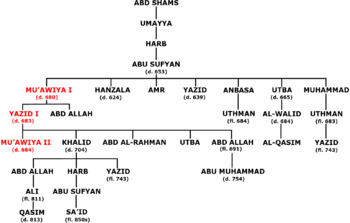Abu Sufyan ibn Harb facts for kids
Quick facts for kids
Abu Sufyan ibn Harb
|
|
|---|---|
| Born |
Sakhr ibn Harb ibn Umayya ibn Abd Shams
c. 0565 |
| Died | c. 653 (aged 87–88) |
| Known for | Leader of the Quraysh of Mecca |
| Spouse(s) | Safiyyah bint Abi al-As Zaynab bint Nawfal Hind bint Utbah Look below to see others |
| Children |
|
| Parent(s) |
|
| Military career | |
| Battles/wars | Battle of Uhud Battle of the Trench Battle of Hunayn Battle of Yarmouk |
Abu Sufyan (born Sakhr ibn Harb ibn Umayya ibn Abd Shams, around 565 CE – died around 653 CE) was an important leader and merchant from Mecca, a city in ancient Arabia. He belonged to the powerful Quraysh tribe.
In his early life, Abu Sufyan often led trade trips to Syria. He was one of the main leaders in Mecca who opposed Muhammad, the prophet of Islam. Abu Sufyan led the Meccan armies in key battles against Muhammad, like the Battle of Uhud in 625 CE and the Battle of the Trench in 627 CE.
However, when Muhammad's forces peacefully entered Mecca in 630 CE, Abu Sufyan was among the first to accept Islam. He then became part of the new Muslim state. He even played a role in the Battle of Hunayn and helped remove the pagan idol of al-Lat in Ta'if.
After Muhammad's death, Abu Sufyan continued to serve the Muslim community. He supported the Muslim army at the Battle of Yarmouk against the Byzantines in Syria. His sons, Yazid and later Mu'awiya, became important commanders. Mu'awiya later founded the Umayyad Caliphate in 661 CE.
Contents
Who Was Abu Sufyan?
His Early Life and Business
Abu Sufyan's birth name was Sakhr. He was born around 565 CE. His father, Harb ibn Umayya, was a leader of the Quraysh tribe in Mecca. His mother was Safiyya bint Hazn.
His family was part of the Banu Abd Shams clan. This clan was related to the Banu Hashim, which was Muhammad's clan. Abu Sufyan became a well-known businessman and financier. He often led trade caravans, which were groups of merchants traveling together, to Syria. He even owned land near Damascus.
Leading the Opposition to Islam
For many years, Abu Sufyan was a strong opponent of Muhammad and the new religion of Islam.
In 624 CE, a trade caravan led by Abu Sufyan was returning to Mecca from Syria. Muhammad's followers planned to intercept it. Abu Sufyan quickly sent for help from Mecca. A large Meccan army of 1,000 soldiers was sent to protect the caravan.
Abu Sufyan cleverly managed to avoid the Muslims with his caravan. However, the Meccan army, led by another leader named Abu Jahl, decided to fight the Muslims anyway. This led to the Battle of Badr. The Quraysh army was defeated. Abu Jahl was killed, as was Abu Sufyan's father-in-law. Abu Sufyan's son, Hanzala, also died in this battle.
After this defeat, Abu Sufyan was tasked with getting revenge for Mecca's losses. He led the Meccan army in the Battle of Uhud in 625 CE. In this battle, the Meccans caused significant losses to the Muslims. However, the Quraysh were not fully satisfied with the outcome.
Two years later, Abu Sufyan led an attempt to surround and attack Medina in the Battle of the Trench. But the Muslim defenders had dug a large trench, which stopped the Meccan army. Abu Sufyan's forces were defeated. After this, other Qurayshi leaders took over the main command in the war against Muhammad.
Becoming a Muslim
Even though he had been a strong opponent, Abu Sufyan later played a key role in making peace. In 628 CE, there was a peace treaty called the Treaty of Hudaybiyya. Although Abu Sufyan wasn't directly involved in those talks, he later met with Muhammad in Medina.
When Muhammad's forces conquered Mecca in 630 CE, Abu Sufyan was one of the first Qurayshi leaders to surrender. He helped ensure the city's peaceful takeover and protected his followers.
After becoming a Muslim, he fought alongside the Muslims in the Battle of Hunayn. This battle was against the Banu Thaqif tribe from Ta'if, who were old rivals of Mecca. The Muslims won a big victory. During this battle, Abu Sufyan lost an eye. He was rewarded for his bravery. Because he had business ties and family in Ta'if, Abu Sufyan also helped remove the pagan idol of al-Lat from that city.
Later Life and Passing
Abu Sufyan was appointed as the governor of Najran, a region in southern Arabia. This appointment was likely made by the first Muslim leader, Abu Bakr, who became Caliph after Muhammad's death.
Abu Sufyan was present at the Battle of Yarmouk. This battle was a major victory for the Muslims against the Byzantines in Syria. Because of his old age, it's unlikely he fought actively. However, he encouraged the Muslim troops during the battle.
His son, Yazid, was a commander in this battle. Yazid later died in a plague. Another of Abu Sufyan's sons, Mu'awiya, became the governor of Syria. Mu'awiya later founded the Umayyad Caliphate, a major Islamic empire.
Abu Sufyan passed away in 653 CE, at the age of 88.
Family
Abu Sufyan had several wives and many children. Some of his notable children include:
- Ramla (Umm Habiba): She married Muhammad.
- Yazid: He became an important military commander.
- Hanzala: He was killed in the Battle of Badr.
- Mu'awiya: He later became the founder of the Umayyad Caliphate.
- Utba: Another son who lived during the time of the Prophet.
- Amr: He was captured in the Battle of Badr but later released.
See also
 In Spanish: Abu Sufyan ibn Harb para niños
In Spanish: Abu Sufyan ibn Harb para niños


